Iran Raises Exit Permit Bond For Medical Students
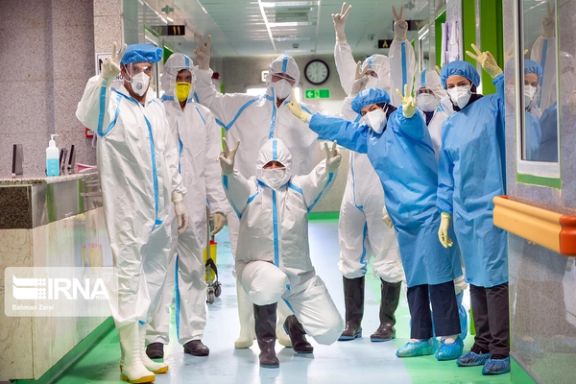
As Iranian doctors are emigrating to other countries in droves, the health ministry has increased the exit permit bond for medical, dental and pharmacy students to $5,000 per year.

As Iranian doctors are emigrating to other countries in droves, the health ministry has increased the exit permit bond for medical, dental and pharmacy students to $5,000 per year.
Deputy minister for education at the health ministry, Abolfazl Bagherifard, said on Monday that students in graduate levels should provide 1.5 billion rials ($5,000) to leave the country for a year and undergraduate levels should provide bonds worth $2,000.
Students must provide an official letter of commitment to return as well as another person's guarantee by depositing a real estate bond or a bank guarantee.
Officials and lawmakers are warning that Iran may be forced to hire foreign doctors as Iranian physicians are leaving in high numbers. Dr Mohammad Raeeszadeh, the head of Medical Council of the Islamic Republic of Iran, recently warned that wrong government policies is causing disillusionment among young medical practitioners and could lead to a wave of emigration or change of career among them.
Earlier in the year in April, Iran's Medical Council said about 4,000 doctors have applied for Certificates of Good Standing in the past 12 months with the intent to leave the country. Council spokesman Reza Laripour said that the annual number of such applications was less than 600 between 2013 and 2015.
An opinion survey conducted in August indicated that almost half of Iranian youth want to leave the country amid pessimism about their future.
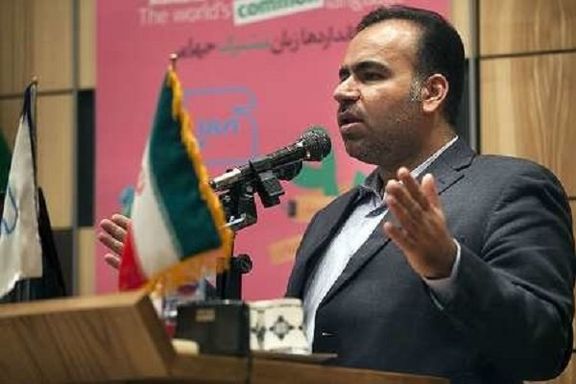
The Iran-Iraq Joint Chamber of Commerce announced on Monday that contrary to government’s claim, Iran's exports to Iraq have decreased in the past five months.
The head of Iran-Iraq Joint Chamber of Commerce, Jahanbakhsh Sanjabi Shirazi, told ILNA that the exports decreased 8 percent in terms of value and 28 percent in terms of weight.
He said the main reason behind the drop is the elimination of cheap government dollars for importing raw material, noting that after its removal prices of Iranian-made products rose above the global baseline, and the first reaction of customers was to stop buying goods.
The drop in Iran's exports to Iraq, which is the country’s second largest trade partner, comes as a member of Iran's Chamber of Commerce admitted in February that Iran is losing Iraq's $30 billion market.
On Sunday, September 11, the head of the Iranian Association of Exporters of Technical and Engineering Services, Bahman Salehi-Javid, said the country’s export of such services has declined to about $500 million from the figure of $5 billion about 10 years ago.
US sanctions have dramatically reduced Iran’s export revenues. Not only Tehran is getting less than half of its usual oil income, but trade in general has suffered because of US banking sanctions, forcing Iran to offer low prices.

Just 13 months after Iran’s President Ebrahim Raisi took office, politicians and media speak of a one-term presidency, citing ample signs of weak governance.
Moderate conservative news website Qarn-e No [New Century] in Iran says the widespread belief among Iranian politicians about the end of Raisi's political career in 2025, has given rise to speculations about former Majles (parliament) Speaker Ali Larijani as a candidate for the next presidential election.
The website said that Larijani, a moderate conservative by Iranian standards who was disqualified as a candidate for the 2021 presidential election, will have a chance to run again, particularly now that according to rumors Supreme Leader Ali Khamenei is thinking to appoint Larijani to the key post of arbitrator among the three government branches.
Following Larijani's disqualification in 2021, Khamenei had said that the Guardian Council's decision to disqualify him was "unfair" and called on the conservative dominated council to compensate for its mistake. However, so far nothing has been seen to that effect.
Larijani’s disqualification was widely seen as move to eliminate all serious candidates who could endanger Raisi’s victory, a quest supported by all hardliners loyal to Khamenei. Therefore, despite the Supreme Leader’s comforting words for Larijani, it was never clear if the order to eliminate his presidential candidacy came from Khamenei’s office.
Whether or not these reports and speculations are true or not, Larijani as an adviser to Khamenei, is now enjoying a solid power base.
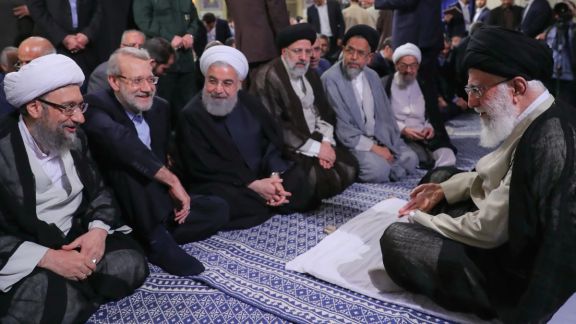
All this is taking place against a backdrop of political turmoil in Raisi's cabinet particularly after his government’s poor handling of the annual mass pilgrimage to shrines in Iraq on Arbaeen. Thousands of people marching to Karbala became ill or dehydrated with no transportation and a place to stay, despite weeks of government propaganda encouraging people to take up the pilgrimage and promises of assistance along the way. Hundreds of thousands of people became stranded at the border crossings and slept in the streets in Iraq.
Other reports say that Raisi will have to fire his road minister Rostam Ghassemi for his shortcomings and one of his Vice Presidents Ensiyeh Khazali after revelations about her son's immigration to Canada with millions of dollars to establish a company there.
In another report, the Qarn-e No wrote that the divide between the government of President Raisi and the people is the widest since 1979 when the Islamic Republic was established. This, the report says is a result of Raisi's failure to fulfil the obligations he undertook and the promises he made to the nation during his election.
In the meantime, Iranian lawmaker Mojtaba Mahfouzi, a member of the Majles Cultural Committee, said in an interview with Didban Iran website on Sunday that "The Raisi administration is obstinate and arrogant, adding that members of his government do not know anything about executive work.
These are probably some of the facts based on which Qarn-e No has concluded that Raisi is likely to be the first Iranian President to serve for only one term.
Mahfouzi said that the Majles is determined to summon and question Interior Minister Ahmad Vahidi for the Arbaeen pilgrimage fiasco.
Meanwhile, Mahfouzi charged that the Raisi administration does not accept any advice from the parliament, and said, “this is no way to run a country.”

Iran’s Social Security Organization has disclosed information about several corruption cases related to petrochemical firms affiliated with it that occurred about 12 years ago.
In an interview released on Sunday, the organization’s managing director Mirhashem Mousavi talked about the cases for the first time to the media, mentioning that one of the cases is worth $2.5 million, another is €2.5 million and a third is about 50 million UAE dirhams.
He said that the cases are being pursued since 2010 and 2011 but no verdict has been issued.
Mousavi added that five high-priced properties, valued at more than half of the total properties of the organization, have been given to others with a deed but the organization has not been able to get more than five percent of the price of one of the properties.
The cases were related to the Social Security Investment Company (SSIC, also known by its Persian acronym SHASTA), one of Iran's major state-owned investment companies, and the investment arm of the Social Security Organization, which provides healthcare and pension benefits for a large population of Iranian middle and working-class members.
The revelations came as a $170 million embezzlement case has left one of Iran’s natural gas producers in serious trouble. Mehr Petrochemicals produces the highest-grade polyethylene in the Middle East but it stands at the verge of bankruptcy, according to Eghtesad Online (Economy Online). The firm belongs to Persian Gulf Holding, a large Iranian quasi-governmental company that claims to be an independent entity, with 15 subsidiaries.
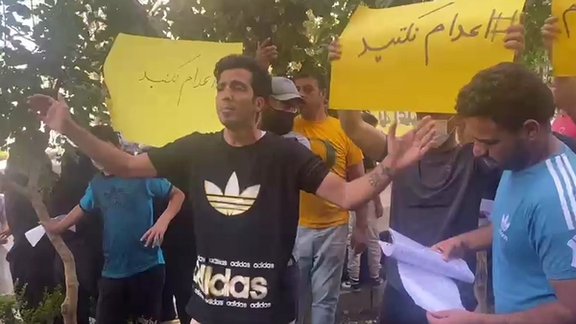
Iranian security forces attacked Sunday a gathering of families of convicts sentenced to death in front of the building of the Judiciary and made several arrests.
According to videos posted on social media police tried to disperse the protesters, who were insisting on keeping the continuing their vigil.
The protesters were carrying placards with the slogans "Don't execute" and "No to execution."
There is no confirmed report of the number of detainees yet, but social media photos and videos show that there were children among the arrested people.
The families of prisoners sentenced to death have been holding demonstrations in front of the Revolutionary Court in the city of Karaj and the judiciary in Tehran for the past week, demanding a halt to the execution of their family members and relatives.
Regular protest rallies with various demands have been held in Iran in recent years, but the gathering of families of prisoners sentenced to death is a rare event.
Late in July, two human rights organizations said Iran has embarked on an execution spree at a “horrifying pace” with at least 251 hangings between January 1 and June 30, 2022.
Amnesty International and the Abdorrahman Boroumand Center for Human Rights in Iran said in a report that the actual number is likely higher, as authorities keep secret figures on death sentences passed and executed.
On June 16, UN Secretary General António Guterres released a report on the situation of human rights in Iran, decrying “the high number of death penalty sentences and executions.” The UN chief said that the number of executions in Iran increased from at least 260 cases in 2020 to 310 individuals in 2021, and the number continued to rise into 2022.
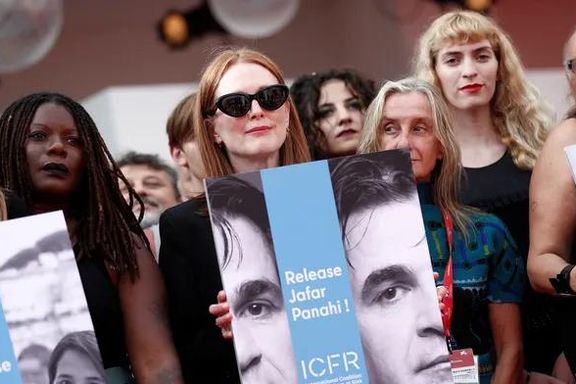
The Venice Film Festival awarded its Special Jury Prize to jailed director Jafar Panahi after participants called for the release of jailed Iranian filmmakers.
Panahi, one of Iran’s most acclaimed directors, who is currently serving a six-year prison sentence from a decade ago, received the awardfor his latest film ‘No Bears’. During the screening of the film Friday an empty chair stood for Panahi.
Directors, actors and activists attending the festival led by jury head Julianne Moore and Audrey Diwan gathered on the red carpet Friday and held up placards with Panahi’s face and the the message: “Release Jafar Panahi!” ahead of the Venice world premiere of his film.
The festival also awarded the Orizzonti (Horizons) Award for Best Film to Iranian director Houman Seyedi for “World War III”, and Orizzonti Best Actor Award to its lead actor Mohsen Tanabandeh. “World War III” is a dark comedy which tells the story of making a film about the Holocaust in Iran.
Panahi, who has also won the Golden Leopard at Locarno Festival, the Golden Lion in Venice, and the Silver Bear at the Berlinale in the past, was first arrested in 2009 for participating in anti-government protests and twice in 2010 and sentenced by a Revolutionary Court to six years in prison and a 20-year work ban but the prison sentence was suspended. since then, he has made his films, including ‘This Is Not A Film’ in 2011, stealthily in defiance of the ban.
He was arrested again last month for protesting the July 8 arrest of two other renowned filmmakers, Mohammad Rasoulof, director of Berlin Golden Bear winner There Is No Evil (2020), and Mostafa Al-e Ahmad (Poosteh) at Tehran’s Evin prison.
Rasoulof and Al-e Ahmad were arrested as part of the Iranian crackdown on the signatories of a collective statement titled “Lay down the gun” issued by more than 100 film industry personalities in the end of May.
Renowned Iranian actress Leyla Hatami was a member of the jury of the Venice International film festival this year. Like other female Iranian artists who live and work in Iran, she appeared in a stylish long dress and headscarf. All female Iranian artists have to abide by the compulsory Islamic dress code (hijab), not only in Iran and in public, but also in films and at foreign film festivals.
Officials of Iran’s clerical government and hardline media often accuse dissident artists and filmmakers, particularly those whose works are awarded by foreign film festivals, of presenting a “dark image” of the Iranian society in their films.
Iran's minister of culture and Islamic guidance Mohammad-Mehdi Esmaili said recently that Iranian films cannot participate in foreign film festivals if they are not authorized to be shown in Iran. “The future of those who act against our national interests, speak against the Iranian people, and take advantage of the cruel sanctions against the Iranian people, is clear.”
Artists, filmmakers, and producers who promote the Islamic Republic’s values and policies, however, receive great support and funding from government organizations.